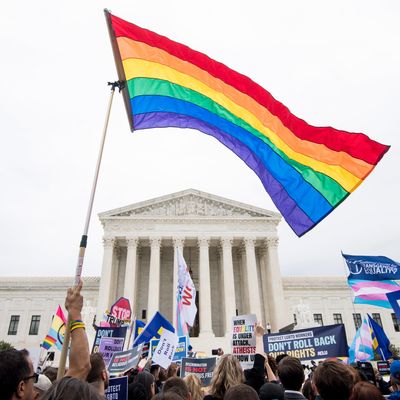
In a sweeping and consequential 6-3 decision, the U.S. Supreme Court has ruled that the workplace anti-discrimination provisions of Title VII of the Civil Rights Act of 1964 banning discrimination on grounds of sex protect LGBTQ employees.
In Bostock v. Clayton County, Neil Gorsuch wrote the opinion for himself, Chief Justice Roberts, and the Court’s four liberals (Ruth Bader Ginsburg, Stephen Breyer, Sonia Sotomayor, and Elena Kagan). Gorsuch, a conservative, followed his “textualist” principles (following the plain meaning of legislative language) — which in this case produced a progressive breakthrough. In holding that Congress’s prohibition of discrimination based on “sex” means more than simply male or female identity, Gorsuch followed a simple test in reasoning that it applies to all discrimination in which an employee’s sex is determinative:
Those who adopted the Civil Rights Act might not have anticipated their work would lead to this particular result. Likely, they weren’t thinking about many of the act’s consequences that have become apparent over the years, including its prohibition against discrimination on the basis of motherhood or its ban on the sexual harassment of male employees. But the limits of the drafters’ imagination supply no reason to ignore the law’s demands. When the express terms of a statute give us one answer and extratextual considerations suggest another, it’s no contest. Only the written word is the law, and all persons are entitled to its benefit.
Writing a long dissent in which Clarence Thomas concurred, Samuel Alito accused Gorsuch of textualist heresy:
In a separate dissent, Brett Kavanaugh disputed Gorsuch’s interpretation of the word sex in the 1964 law as representing a “literal” but not “ordinary” meaning of the term.
The scope and thus the impact of this decision is hard to overstate, aside from the immediate protections it offers for “approximately 1 million workers who identify as transgender and 7.1 million lesbian, gay and bisexual workers,” as CNN observes. Among other things, it will likely doom new proposed regulations from the Trump administration stripping health-care protections from transgender individuals, since it was explicitly based on Alito’s rejected interpretation of the language of discrimination according to sex:
Politically, the fact that Trump’s first Supreme Court nominee, Neil Gorsuch, wrote this decision could be ominous for the president. A big part of his appeal to conservative Christians was that he would reshape the Supreme Court to reverse past extensions of LGBTQ and reproductive rights, while expanding “religious liberty” rights that give them a constitutionally sanctioned privilege to discriminate in both those areas. The administration can only hope the Court goes sharply the other way on abortion and religious liberty, beginning with big cases that could be decided any day now.






























